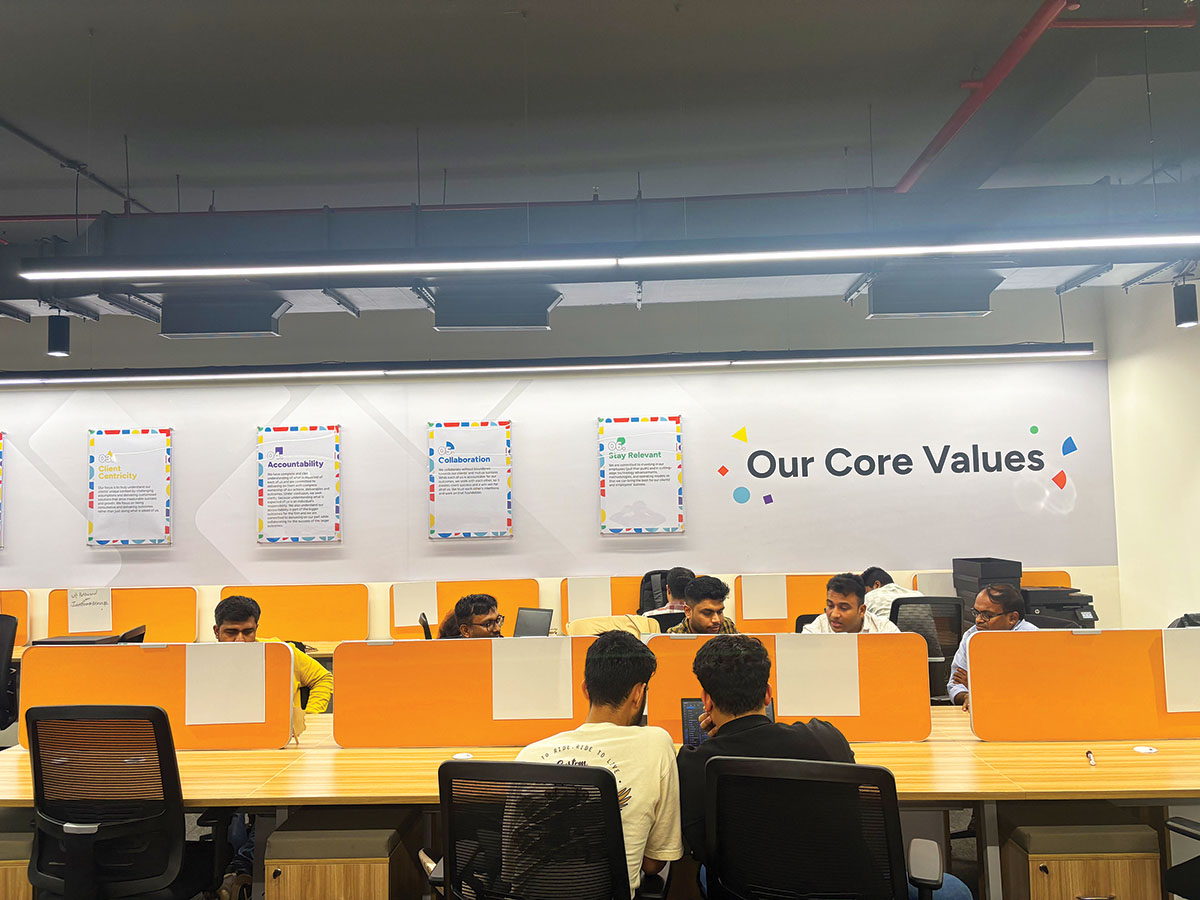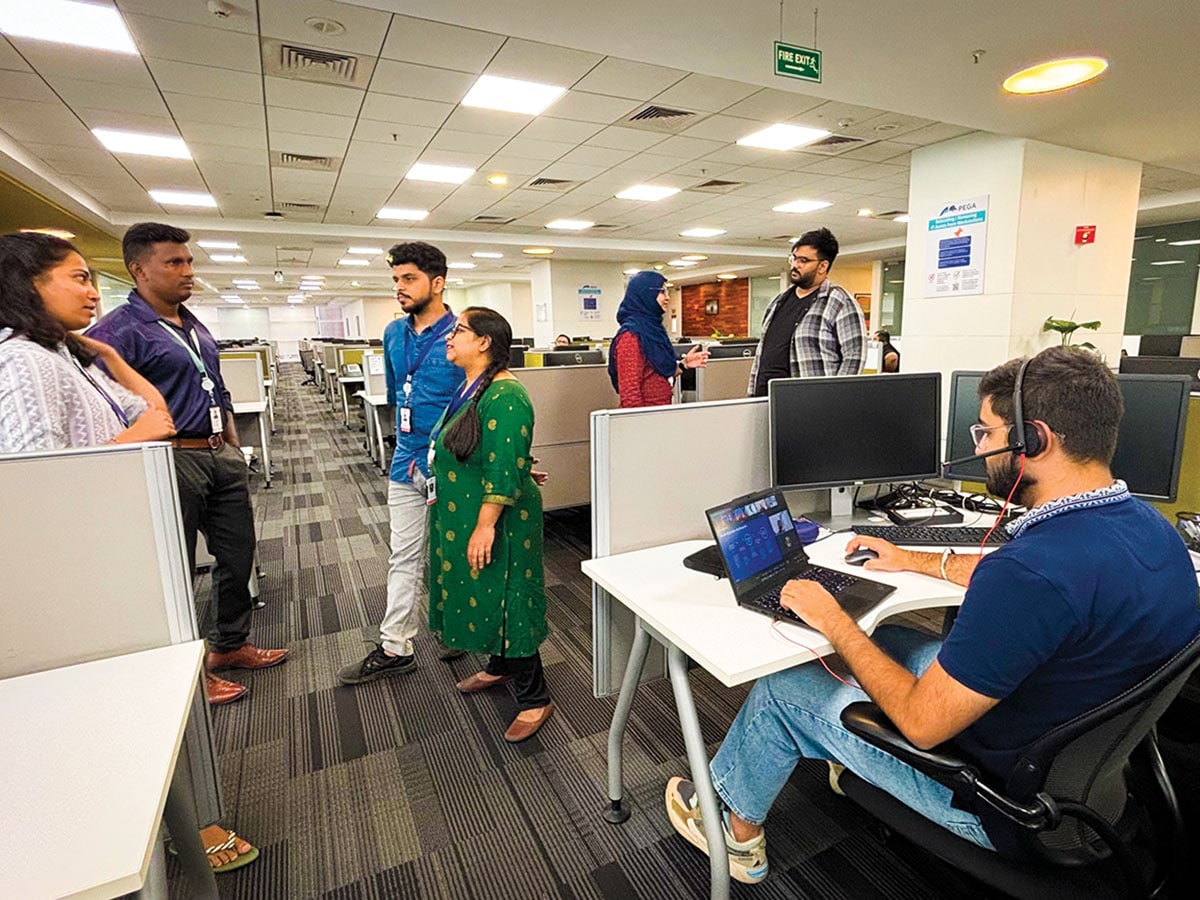How the AI boom has put the spotlight on workforce reskilling
TCS’s decision to lay off 12,000 mid- and senior-level employees brought skilling back into focus. But are seasoned professionals ready to adapt?


As a general manager handling talent acquisition at Plum Benefits, a B2B startup in the health insurance and employee benefits space, Geetanjali Kumar used to frequently field requests from hiring managers for real-time updates on their candidates.
To reduce the time spent on such repetitive tasks and ensure that stakeholders have visibility at all times, she created a dashboard using artificial intelligence (AI) tools such as ChatGPT, Claude and Lovable for everyday use. “One immediate result is that I’m receiving fewer requests for updates, and my team is less troubled,” says Kumar.
The dashboard took two weeks and about five iterations to complete, but it has enabled Kumar’s team to work on projects in her absence sans any manual intervention. Most importantly, it fosters greater accountability for her team. “In a different world, this would have taken the team at least a month to build and would require considerable bandwidth from the engineering teams,” says Priya Sunil, the company’s vice president of people success.
It’s no secret that more and more companies are now embracing AI to streamline operations. But, as TCS’s recent decision to lay off 12,000 mid- and senior-level employees has shown, it’s a different question that confronts them: Are the professionals ready to upskill and adapt?
TCS’s move to prune 2 percent of its workforce comes at a time when the demand for mid- and senior-level roles in tech and IT services has shrunk marginally. Over the past year, these roles have reduced by about 6 and 5 percent, respectively, says Sashi Kumar, head of sales at Indeed India, a global job hiring platform.
The shift is symptomatic of a larger trend: The shelf life of skills is shrinking rapidly first due to the pandemic-driven digital transformation, and now the GenAI boom. Which means professionals need to constantly update their skill stack to stay relevant, says Ashutosh Gupta, managing director-India and Asia-Pacific, Coursera, an upskilling platform.
That upskilling is all-encompassing is evident from the fact that the role of leaders, too, has evolved from just managing operations or delivery. “Companies want leaders who think with a digital mindset, understand new technologies like AI, and can drive bigger changes,” says Neeti Sharma, CEO of TeamLease Digital, a technology and IT staffing solutions firm. The needle is clearly moving from skilling being a backroom buzz to a part of the boardroom conversations.
“The momentum is real—learning and development budgets have grown,” says Rohit Sharma, president-consumer business, upGrad, an upskilling platform. “We’re seeing CXOs place serious bets on talent readiness, especially around GenAI. It’s no longer just about awareness; the focus is now on outcomes, efficiency and long-term capability-building,” he says. upGrad recorded a 40 percent year-on-year increase in enrollments from mid-career professionals in 2025.
At the upskilling platform Simplilearn, there has been a 56 percent increase in year-on-year enrollments from mid-to-senior-level professionals over the past year, especially in AI, cybersecurity and leadership programmes, says Kashyap Dalal, co-founder and chief operating officer. Between the first and second quarters of this year, technology education platform Scaler, too, has seen enrollment from mid-career women professionals grow by over 50 percent across programmes like data science and machine learning.
“This uptick isn’t incidental. It reflects a broader pattern we are observing in response to AI adoption, role automation, and post-layoff recalibrations across the tech industry,” says Abhimanyu Saxena, co-founder.
At Coursera, there have been two enrollments every minute for GenAI learning this year. The share of enrollments from senior individual contributors, managers and directors in India grew from 55 percent in the first half of 2023 to nearly 65 percent during the same period in 2025, highlighting a sharp increase in engagement from experienced professionals, says Gupta.
While the conversation around skilling has gained momentum, action at scale is lagging.
A report by UpGrad, titled Skilling Smarter, released in May, with insights from over 12,000 professionals, shows that 75 percent only engage in skilling when it’s mandated by their organisation.
“The drive to pick up new skills is strong, but support from employers is uneven. Nine in 10 workers say their company offers some training, but the numbers vary by function,” says Kumar of Indeed. “India’s professionals are ready to upskill. Companies have a chance to close that gap by making learning a part of everyday work, not an afterthought,” he adds.
For senior professionals, the challenge isn’t just access to learning courses, it’s what and how to learn in a way that respects their time, sustains motivation, and addresses their concerns around redundancy. Which is why one of the biggest problems they face is identifying the right programmes that can help them—those that are slightly outside their comfort zone, requiring them to either get hands-on with the latest technologies or apply their experience to business transformation case studies, explains Dalal of Simplilearn.
Saxena of Scaler feels that many professionals are at a crossroads—decades of experience behind them, yet facing an industry that’s being rapidly reshaped by AI, automation and evolving tech stacks. “Traditional upskilling models often fall short for this group, which is why learning formats that are flexible, high-touch and application-driven are proving most effective,” he says.
To worsen matters, receptivity varies among this cohort of professionals, posing a hurdle in their learning journey. “Many senior professionals have built careers on deep domain knowledge. Now, they’re being asked to unlearn and rewire, often in rapidly evolving areas like AI or automation. That’s not easy,” says Pushkar Bidwai, CEO of People Matters, a community of HR and talent leaders across India and Asia-Pacific. “But when you frame it as a growth opportunity, or a way to expand influence and stay relevant in strategic conversations, it resonates much better.”
Time is another challenge. Leaders often juggle multiple responsibilities, leaving little room for focussed learning, which is why the most effective programmes are those that embed learning into real projects—learning while doing, rather than in isolation, Bidwai feels. Competing priorities also add another layer of complexity. Sunil of Plum Benefits feels that if the learning course is not valuable, it gets deprioritised.
So, effective skilling isn’t just about enrollments, but also relevance and impact. As a result, a traditional one-size-fits-all training doesn’t work for the mid-to-senior management, says Rakesh Prasad, senior vice president-strategy and solutions, Innover, an AI services company. In his experience, leaders are receptive to learning once they understand the ‘why’. The key is to show them how new skills, whether it’s AI fluency or agentic thinking, can amplify their effectiveness, not diminish it.
“Of course, there will always be a few who take longer to adapt, but they are the exception, not the norm. By aligning learning with individual and team impact, we’ve found that senior leaders not only accept change, they also drive it,” says Prasad.
The challenge is not unwillingness to learn; it is the failure to deliver relevant, high-impact skilling that speaks to their context, says Adam Caplan, president of digital business and AI, Altimetrik, an AI-first digital engineering solutions company. “Senior employees need clarity on how their experience fits into the evolving landscape and how they can lead, not follow the change,” he says. “Neglecting this segment of the workforce is a strategic misstep. It leads to fragmented execution, lower adoption, and a loss of institutional knowledge.”
Progressive organisations are addressing these challenges head-on by integrating senior professionals into digital programmes from the outset. For instance, at AI-first design and technology partner, Tata Elxsi, structured programmes to reskill leadership have evolved significantly in the past few years.
“We avoid a top-down nomination approach; instead, we co-create skilling journeys that are purpose-driven and aligned with business outcomes,” says Jayendran G, head of learning and development.
At Pegasystems, an AI-powered platform for enterprise transformation, upskilling is not just about staying current but also competitive—so, the company has moved away from one-size-fits-all training to curated, role-based learning journeys that align with business goals, explains Smriti Mathur, vice president-people India and global talent advisory.
At Plum Benefits, helping leaders build fluency in emerging areas, especially AI, has been a priority this year. “Our founders have had long conversations with each leader on how to use AI in their everyday lives, including auditing tasks and brainstorming on what can be executed with workflows and automation,” explains Sunil.
In a world where over 80 percent of professionals are concerned about job redundancy due to emerging technologies like AI, Prasad of Innover believes it is critical to prepare leadership not just to adapt, but also to lead transformation. When GenAI emerged, Innover rolled out a companywide enablement programme, designed not just to explain the technology, but to contextualise its relevance for every leader’s function. They also empower leaders with access to self-paced platforms like Udemy, encouraging independent learning. “Our belief is simple—senior professionals, by nature, are expected to be self-motivated and aware enough to guide their own upskilling journeys,” says Prasad.
Caplan explains that three years ago, it was enough for leaders to be tech-aware, able to follow digital trends and rely on experts for execution. Today, that baseline has shifted drastically. Leaders must be tech-immersed—capable of understanding how technologies like AI, machine learning and cloud platforms directly impact products, customers, operations and value chains. Leaders are now expected to take direct ownership of how technology enables business strategy. “AI cannot sit in silos or remain the responsibility of a few technical teams. It must be embedded in decision-making at every level,” he says.
Additionally, data literacy has become non-negotiable. Caplan adds, “This no longer means leaders must be hands-on data analysts. Instead, they must be able to work effectively with GenAI tools, using them to interrogate datasets, surface patterns, detect bias and generate insights.”
Beyond technical understanding, human-centered leadership is key because, as automation takes over routine tasks, human traits like empathy, ethical judgement and contextual decision-making are emerging as true differentiators.
“Leaders must now cultivate trust at scale, guide teams through the emotional complexities of change, and create environments where people feel supported through both upskilling and the redefinition of their roles,” Caplan feels.
First Published: Sep 17, 2025, 12:50
Subscribe Now(This story appears in the Sep 19, 2025 issue of Forbes India. To visit our Archives, Click here.)
